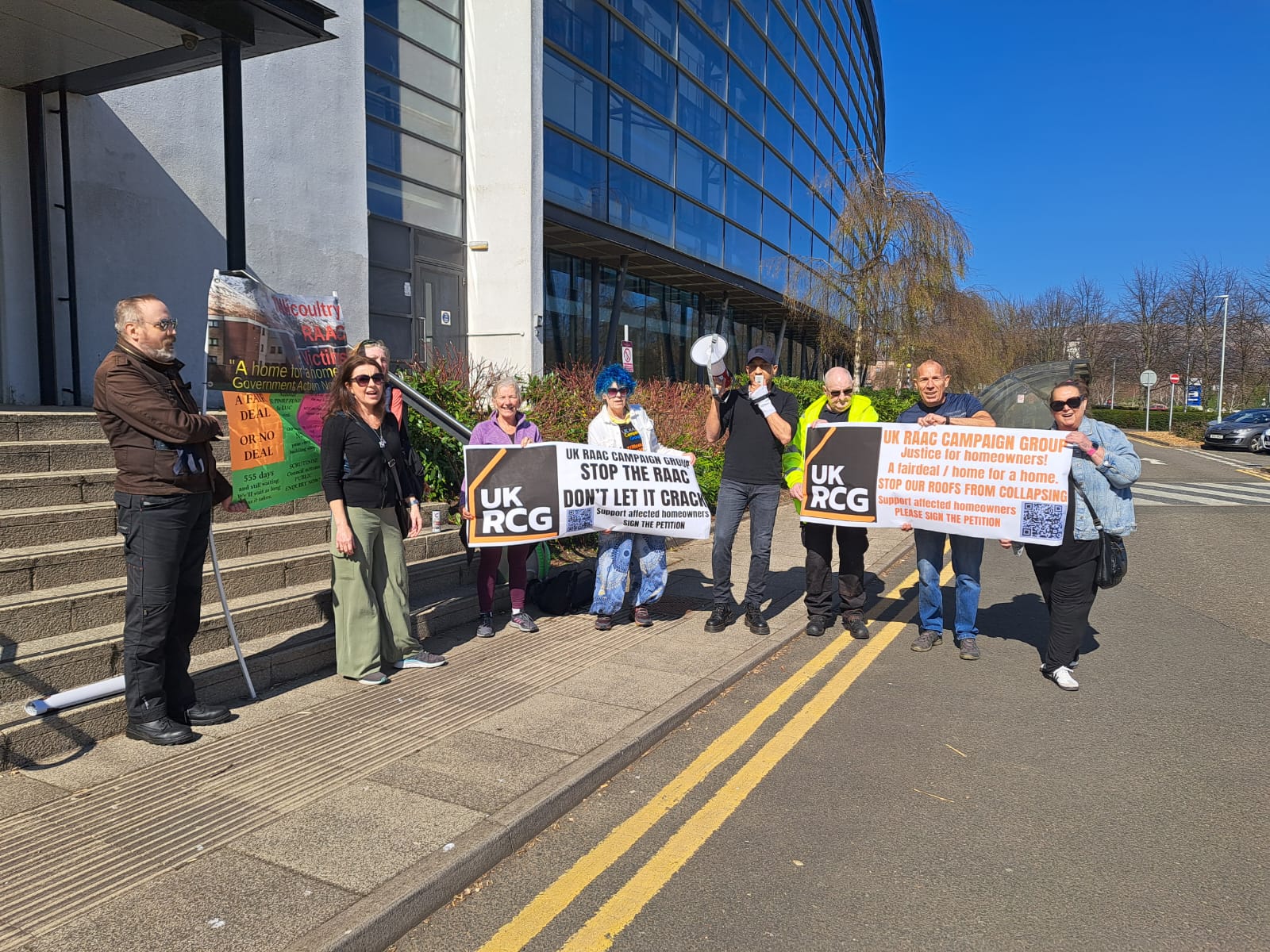UK: For many homeowners in Renfrewshire, the past few years have been a period of growing anxiety and uncertainty. At the heart of this is the issu
Scottish Homeowners Betrayed by Housing Minister: RAAC Funding Denied, Accountability Needed. Report by Wilson Chowdhry
UK: In a recent session Local Government, Housing and Planning Committee, of the Scottish Parliament, Cabinet Secretary for Housing, Mairi McAllan MSP, confirmed that there will be no dedicated Scottish Government fund to support councils or homeowners affected by Reinforced Autoclaved Aerated Concrete (RAAC)
Her statement came in response to a question from Fulton McGregor MSP (Coatbridge and Chryston), who raised concerns about the significant challenges facing North Lanarkshire Council — an area known to have several buildings affected by RAAC. McGregor asked whether there would be any direct financial support for councils working to meet deadlines and carry out essential safety works.
Ms McAllan’s response made the government’s position unequivocally clear. While she highlighted the substantial funding being channelled into cladding remediation across Scotland — which followed the Grenfell tragedy — she drew a firm line between cladding and RAAC, calling the latter “a building standards issue.”
“RAAC is a product which, when maintained properly, can remain usable and safe,” she said. “It is still used in countries throughout the world… but public money simply cannot stretch to that scale. The position on funding in respect of RAAC is that it is a homeowners’ issue — essentially a matter of building maintenance.”
Ms McAllan went on to confirm:
“There will be no RAAC pot of money from the Scottish Government. We simply do not have the flexibility to provide that. There is only one government across the United Kingdom that has the flexibility to respond to unforeseen expenditure like that, and that’s the UK Government. That’s why I’m pressing them to create a national RAAC fund.”
The Cabinet Secretary added that while no direct financial assistance would be made available, councils could apply for flexibility in how they use existing funding allocations. She also cited recent discussions with Aberdeen City Council as an example of how such flexibility might be negotiated.
A Troubling Admission
Ms McAllan’s comments, though candid, confirm what many Scottish RAAC homeowners have long feared — that they will be left to shoulder the financial burden of repairing or demolishing their unsafe homes.
As Chair of the UK RAAC Campaign Group, I must express both disappointment and alarm. For months, Scottish residents — particularly in Clackmannanshire, Stirling, and North Lanarkshire — have faced evacuation, displacement, and mounting stress as their homes deteriorate. Many have been told they may never return, yet no clear funding pathway or compensation framework exists.
While Ms McAllan is correct that the origins of RAAC predate devolution and stem from UK-era housing policies like Right to Buy, this cannot justify the Scottish Government’s abdication of responsibility. Housing safety and local government oversight are devolved matters, and it is within the Scottish Government’s remit to ensure its citizens are protected from structural risk.
The suggestion that the issue rests solely with homeowners is particularly troubling. Ordinary residents could not have known their homes contained a defective structural material hidden within roofs and walls — often sanctioned and maintained by councils or housing associations themselves.
To classify RAAC as a simple “maintenance issue” is to ignore its systemic nature: a national construction failure with far-reaching social and economic consequences.
The Need for a UK-Wide RAAC Fund
“I welcome Ms McAllan’s call for the UK Government to establish a national RAAC remediation fund, as the issue extends beyond Scotland’s borders — affecting schools, hospitals, and some homes across England, Wales, and Northern Ireland. However, while Westminster deliberates, devolved administrations cannot remain passive; they must take responsibility and implement their own solutions to protect and support their citizens if the UK Government fails to act.”
A coordinated, multi-tiered response is essential:
Immediate relief and rehousing support for displaced homeowners;
Funding for surveys, stabilisation, and remediation through joint government-council schemes;
Transparent communication channels to restore trust;
And a unified UK RAAC strategy that prevents duplication and confusion across jurisdictions.
Until such measures are implemented, homeowners remain trapped — many paying mortgages on uninhabitable properties, others watching their once-safe communities fall into disrepair.
Misplaced Priorities and Deflection
It is deeply concerning that Ms McAllan’s public comments prioritised discussions with mortgage lenders and insurers rather than addressing the desperate circumstances of affected homeowners. Those who purchased their properties under the Right to Buy scheme did so without any identification of RAAC and without ever being informed of the need for specialist maintenance. Many residents have therefore seen their homes deteriorate beyond repair through no fault of their own.
Her distinction between cladding as a “defective material” and RAAC as merely a “maintenance issue” is disingenuous, particularly as these homes were sold under a UK Government programme without forewarning of risk. Ms McAllan’s claim that “RAAC is still used in countries throughout the world” deliberately omits the critical fact that RAAC is banned from use in the United Kingdom, including Scotland. That ban exists for a reason — the material has proven unsafe in the UK’s climate and construction conditions. To cite continued use abroad as reassurance is misleading when those nations have entirely different building standards and environments.
Equally misleading is her assertion that only the UK Government has the “flexibility” to respond financially. In reality, housing is a devolved responsibility, and the Scottish Government has both the authority and the resources to act. In a letter dated 8 October 2025, Samantha Dixon MBE MP, Parliamentary Under-Secretary of State for Building Safety, Fire and Democracy, reaffirmed that:
“Following the Spending Review, the Scottish Government is receiving the largest settlement in real terms between 2024-25 and 2028-29 since devolution in 1998.
This record settlement will deliver an extra £9.1 billion over the Spending Review period for the Scottish Government to deliver public services… including £510 million in capital expenditure in order to deliver on priorities such as the NHS, education, transport and housing.”
Despite this, Ms McAllan continues to insist that responsibility lies with Westminster, a stance that is both disingenuous and evasive. Her government’s refusal to allocate funds for RAAC remediation while continuing to invest heavily in vanity projects is an insult to families living in limbo.
Furthermore, when questioned on the need for a High-Risk Register — a measure long advocated by the UK RAAC Campaign Group — Ms McAllan referenced the creation of a RAAC and Housing Leadership Body. Yet she failed to acknowledge that this group excludes any representation from affected homeowners, a decision that further undermines transparency and trust. It appears that political image and fiscal preservation have once again been placed above public safety.
Misleading Media and Aberdeen Funding Concerns
Articles in the Press & Journal and the Dundee Courier have heightened hopes among RAAC homeowners in Aberdeen, suggesting that the funding flexibility mentioned by Ms McAllan could provide real relief. In reality, this “flexibility” has done little more than strengthen Aberdeen City Council’s ability to pursue Compulsory Purchase Orders (CPOs)—a concern I first raised nearly a year ago and reiterated during multiple deputations at council committees.
Ms McAllan stated that councils could use their existing budgets to support homeowners without attaching caveats. Yet even Aberdeen’s Deputy Council Leader, Cllr Christian Allard, appeared hesitant to follow this advice, seemingly ignoring the Minister’s guidance that council budgets could be leveraged for remediation. Cllr Allard commented:
“To be able to apply for £10 million has got to be good news, but if it is coming out of the housing revenue account, that’s not just for RAAC, so I’d like to find out more about how this could help tenants and owner occupiers. And look at the legality of it.”
This reluctance only reinforces the urgent need for a dedicated national RAAC fund from the Scottish Government, rather than relying on inconsistent local council budgets that may be withheld or constrained.
Evidence of Systemic Failures and Calls for a Public Inquiry
While Ms McAllan continues to frame RAAC as a maintenance issue and emphasizes mortgage and insurance implications, she has ignored the substantial evidence we have compiled of historic government and regulatory failures, which suggest a pattern of systemic oversight and potential conflicts of interest. Read more here.
The UK RAAC Campaign Group has prepared a detailed dossier documenting decades of decisions, approvals, and promotions that facilitated the widespread use of RAAC and Siporex in public housing. Our findings include:
Research and promotion of RAAC by the Costain Group and the Edinburgh Research Unit, including guidance that directed councils and housing associations toward system-built housing incorporating RAAC;
Evidence of political influence, including visits for MPs to Sweden to promote RAAC technology, and parliamentary advocacy by Albert Costain MP, raising serious questions of conflicts of interest;
Regulatory failures, such as the Ronan Point safety review being conducted by the same institutions that had previously promoted RAAC systems, with Scottish properties excluded from proper scrutiny;
Historical documentation showing councils and developers were aware of RAAC’s vulnerabilities, yet homes continued to be sold under Right to Buy without adequate warnings to buyers.
This evidence underlines that the RAAC crisis is not simply a matter of homeowner maintenance, but a profound failure of public oversight, accountability, and transparency, with devastating consequences for thousands of families across the UK.
We have formally called for a statutory Public Inquiry into RAAC to investigate the original approvals, corporate lobbying influence, regulatory failures, and the full impact on affected residents. We are preparing to present this evidence directly to Ms McAllan and other government officials in one of the proposed meetings she has confirmed with homeowners in dialogue with the UK RAAC Campaign Group, pressing for urgent action and full accountability.
You May Also Like
UK: Protestors staged Renfrewshire’s first RAAC demonstration in October 2025, responding to the lack of communication from Linstone and Brid
Washington DC: Today was a deeply meaningful day. We had the honor of welcoming a delegation from the Social Agency for Welfare and Advancement in

On demand of our readers, I have decided to release E-Book version of "Trial of Pakistani Christian Nation" on website of PCP which can also be viewed on website of Pakistan Christian Congress www.pakistanchristiancongress.org . You can read chapter wise by clicking tab on left handside of PDF format of E-Book.









